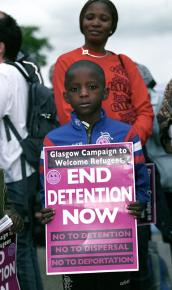Deportation in black and white
Irish journalist and socialist reports on a rash of unlawful detentions of immigrants in the UK.
THE PROBLEM for Jamiu Omikunle wasn't so much the validity of his visa as the color of his skin.
Omikunle is the Nigerian student awarded £20,000 (around $28,500) for having been unlawfully detained at Aldergrove airport in Belfast, held in a detention center in Scotland for nine days, and threatened with deportation.
Omikunle was lucky. He had a friend in Belfast who found him a lawyer, who tracked him down to Dungavel Center in Lanarkshire.
Nobody knows how many people legally present in the United Kingdom have been unlawfully expelled, or how many of these cases began with arrests at a Belfast port or airport.
Omikunle arrived at Aldergrove from London on June 2 last year. His purpose was to act as godfather to Syienna, the infant daughter of his friends Jahawill and Caroline. As he entered the terminal building, he was stopped by an immigration officer. He says, "I was conscious of the fact that only Black people were being stopped. I was very uncomfortable about this."
The officer refused to believe he had come to Belfast for a christening. He was photographed and fingerprinted, taken to Antrim PSNI station and locked in a cell. Next morning, he was put on the ferry to Scotland with a number of other Black people, all in handcuffs. "There were lots of couples and families with children, and all of them were looking at these Black people in handcuffs," he says. "I have never felt as humiliated as I did on that journey."

The group was taken in a bus to Dungavel. Says Omikunle:
Dungavel Detention Center is a prison in every respect. Detainees are locked up. Their belongings are taken from them. The center is enclosed by barbed wire...It is massively overcrowded...There have been a number of suicides in the Center in the past. On the day that I was committed to Dungavel, a story appeared in the Scotsman newspaper comparing Dungavel to Guantánamo, and calling for the Center to be closed.
The Scotsman story referred to Canadian national Corellie Bonhomme, who had been held at Dungavel for five weeks. The newspaper reported her account of being pinned down by immigration officials and her 2-year-old daughter, Fi, snatched from her. Fi was placed in care with Lanarkshire social services. The Guantánamo comparison came from John Scott, chairman of the Howard League for Penal Reform in Scotland.
Bonhomme, who is Black, had been arrested in Belfast as she boarded the ferry for Scotland. Her visa had expired. She claimed that this had resulted from oversight and offered to return immediately to Canada. Instead, she was taken to Dungavel.
She told the Scotsman from inside the center: "I am scared that I am becoming invisible, and no one knows I am here. I feel quite suicidal, and only the thought of Fi keeps me going."
She was allowed to return home after the intervention of the Canadian government, and pleas from all the main Scottish churches and representatives to Scotland's Parliament from all parties. Commented John Scott: "Ms. Bonhomme is an articulate woman who speaks English...Think how much worse is the plight of those without her persistence and advantages."
OMIKUNLE, TOO, had advantages. He was an English-speaking university graduate with a loyal friend immediately on the case, and a determined legal representative. The reason given for his initial detention had been that he had applied for his visa to take a post-graduate course at Coventry University, but, having arrived a day late for registration, had switched courses to Greenwich College in London.
In the High Court last July, Justice Weatherup pointed out that, "It was not a condition of his student visa that he should become or remain a student at Coventry University."
It is hard to comprehend how an immigration official sufficiently senior to be able to order an arrest could have so fundamentally misunderstood visa regulations. But such misunderstandings are seemingly not rare.
In October 2007, there was considerable publicity in Northern Ireland media about the case of a Zimbabwean visitor, Frank Kakopa, arrested and detained despite his presence in the UK being entirely legal. His case was portrayed as having resulted from an unusual and unfortunate mistake.
But, says Omikunle's representative, Barbara Muldoon:
I have received judgments in three almost identical cases in the last couple of months. In all three, the Home Office was alleging that people were illegal entrants and was arranging their expulsion. In all three cases, those involved were found not to be illegal entrants and were released...
Questions need to be asked at the very highest level about what is happening in the ports and airports of Northern Ireland.
Here, as in Scotland, immigration is not a devolved matter. There is no direct local involvement in immigration proceedings. In Scotland, this hasn't prevented the issues from prompting major controversy. (The Southern Ireland authorities are directly involved here, with officials from Dublin working alongside UK officials at ports and airports.)
People with a legal right to be here are regularly being unlawfully arrested and detained. An unknown percentage have unlawfully been put onto planes and deported. There is need, at the least, for questions to be asked.
Says Omikunle: "I am an honest person. I have never been in any trouble of any kind in my life. I have always shown respect for authority. I have never knowingly harmed anyone...I did not deserve this to happen to me."
Of course, it's unlikely any of it would have happened if he'd been white.
First published in the Belfast Telegraph.


